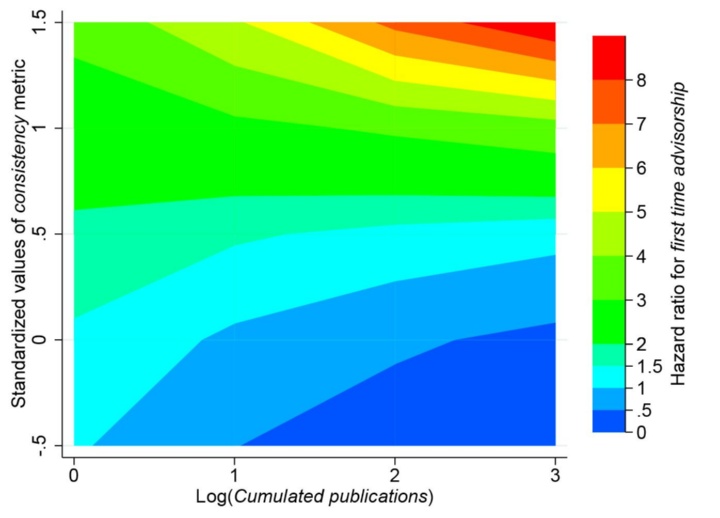“Publish or perish” is a dictum among scientists when it comes to the academic career path. That is not wrong, but one has to publish on the right topic and, above all, consistently, says a study recently published in American Sociological Review and led by Prof. Raphael Heiberger from the Institute for Social Sciences at the University of Stuttgart.
For every scientist, it is imperative to publish as many papers as possible in order to promote their academic success. However, the study published in American Sociological Review shows that this correlation depends on other mechanisms of content specialization and only applies under very specific conditions. On the basis of more than 80,000 dissertations in the field of social science that were completed at universities in the US between 1980 and 2015, the researchers reconstructed the academic curricula vitae of doctoral researchers based on their publications. As a measure of success, they chose the promotion to supervisor, since this status is the prerequisite for other important career steps such as a professorship.
Within the framework of the study, the researchers looked at different facets of content specialization of the publications, especially at the early career stage: the subject matter, the focus, the degree of innovation and, above all, thematic consistency. For the evaluation, a technology of “unsupervised machine learning” was used, namely the “structural topic model”. In this method, large amounts of text are analyzed by computer to find basic structures.

Thematic consistency is the strongest factor
First of all, the models show that specific topics and a high degree of innovation are associated with academic careers that lead to a role as a supervisor. In the humanities and social sciences, this is especially true for topics related to the “cultural turn” - a term that encompasses all forms of human work and life. The strongest effect, however, is seen with thematic consistency: Young researchers who stick to the subject they chose for their doctorate have, ceteris paribus, more than twice the chance of success than their fellow researchers who often change their research topic. “Since there is a high degree of specialization within the disciplines, young researchers should choose a topic for their dissertation that is as innovative as possible, and stick to it,” says Prof. Raphael Heiberger, who is the head of the Department of Computational Social Science at the Institute for Social Sciences. “In this way, they publish in specific journals, build networks, and are more likely to be cited.”
If the researchers follow that strategy, a relatively small number of consistent publications will be sufficient for them to become established in the chosen field. Conversely, publishing a large number of papers, but on different topics, can even be detrimental to an academic career. “So our study can add a number of important nuances to the imperative of ‘Publish or perish’,” Heiberger says. According to the social science expert, it has not been investigated so far to what extent the results of the study, which focused on the science system in the US, can be applied to European conditions or to other disciplines. “But I suspect they can.”
Expert Contact:
Prof. Dr. Raphael Heiberger, University of Stuttgart, Department of Social Sciences VII (Computational Social Science), Tel.: +49 711 685-81132, E-Mail
Original publication:
Heiberger, Raphael H., Munoz-Najar Galvez, Sebastian, and McFarland, Daniel A. (2021). „Facets of Specialization and Its Relation to Career Success: An Analysis of U.S. Sociology, 1980 to 2015“. American Sociological Review, 86(5).


